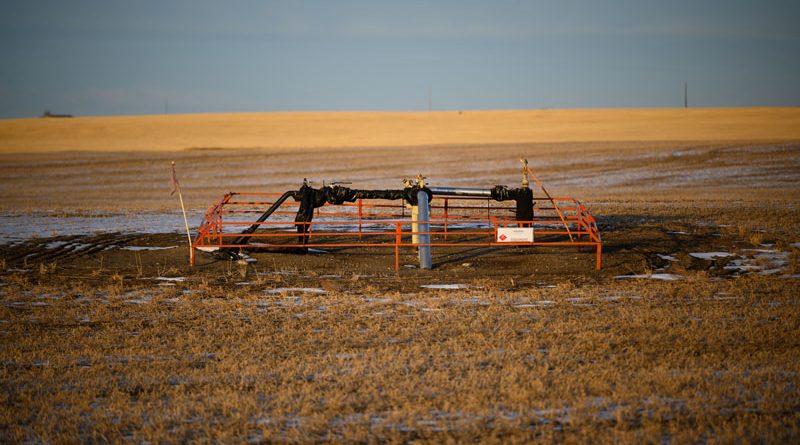Energy assessment review paused but industry given tax supports
By Sean Feagan, Local Journalism Initiative Reporter

Sean Feagan Photo
The provincial government has paused plans to update the taxation assessment model for oil and gas developments but has provided interim tax relief for energy companies.
In Alberta, the amount of taxes energy companies must pay municipalities for oil and gas developments is determined by an equation considering several factors, including base costs, depreciation, and production, known as the “assessment model.”
Energy representatives have said the current model is antiquated (it was last updated in 2005) and does not incorporate true asset depreciation, and thus places an unfair tax burden on energy companies at a time when many companies are struggling.
In response to this concern, the provincial government has been conducting a review of the assessment model that included four scenarios – differing by factors such as to how base costs are treated and how depreciation is calculated – all of which would result in a lowered tax bill for energy companies.
While adopting these changes would have helped energy companies remain viable, they would have also resulted in a seven to 20 per cent reduction in tax revenue for municipalities across Alberta. Throughout the summer, this caused protest among many rural municipalities relying on tax revenue from oil and gas developments to fund a large portion of their budgets – and from the Regional Municipalities of Alberta (RMA), an organization that represents and advocates for them. If the changes were implemented, municipalities would need to raise taxes significantly, cut services or do both, many said.
However, a decision to stop the review for now was announced by Tracy Allard, Minister of Municipal Affairs, during an Oct. 19 press conference.
“I felt we needed a better understanding of our municipalities’ concerns and the overall impact of any change,” she said. “I believe that you can’t tinker with the pieces without taking a step back and looking at the whole of what you’ve done.”
The decision to pause the review was applauded by Wheatland County Reeve Amber Reeve.
“Wheatland County council appreciates that the Ministry of Municipal Affairs considered the feedback from municipalities across the province and took our rural perspective into consideration in their decision-making process,” said Link. “We are pleased to hear that none of the initial four scenarios, which had assessment reductions for Wheatland County between 11 and 19 per cent, will be implemented.”
While the assessment review has been stopped for now, energy companies will receive new tax supports as an interim solution. New wells and pipelines will be exempted from property taxes for three years. This change will be reflected in the 2021 assessed values, and applied for taxation in 2022, 2023 and 2024. “This provides effective incentive for future investment decisions for our industry partners at a time when we need it more than ever,” said Allard.
Also, the well drilling equipment tax, a tax paid to municipalities to offset costs of maintaining roads used by well equipment, will also be eliminated for new drills across Alberta. This change is expected to be permanent, according to the RMA.
“Eliminating this tax will encourage industry to drill more wells within our communities at this time,” said Allard.
Additionally, the province will enact a three-year assessment reduction on low-producing wells.
Together, these measures will provide certainty to investors, municipal governments and to local taxpayers, said Allard.
These changes will help the industry, and in turn, Alberta’s economy, said Tim McMillan, president and CEO of the Canadian Association of Petroleum Producers. “The Alberta government’s action to incent new drilling and provide relief to mature wells is a crucial step to help restore investor confidence and preserve and create jobs for Albertans,” he said.
Together, these changes are expected to result in $80 million in municipal and education property tax revenue reductions for municipalities. But while that loss will have a significant impact on municipalities, it will be far less of a hit than what was previously proposed under the four assessment review models, according to the RMA.
The same is true for Wheatland County, specifically.
“We are still analyzing impacts these changes will have on Wheatland County’s assessment base and therefore budget, however we are optimistic heading into the next three years,” said Link. “Preliminary analysis is showing an estimated reduction of $800,000 in revenue due to the changes, which is significantly less than what we were originally anticipating.”
Wheatland County remains supportive of its energy industry.
“We recognize the significant challenges the intersection of the pandemic, the economic downturn, and the market impacts of negative demand and supply shock during the price wars have had on the oil and gas industry,” said Link. “Wheatland wants to be part of the solution. We want our energy industry, and all industry, in Wheatland County to prosper and we recognize the critical contributions industry makes to our communities.”
But in future efforts to develop a long-term solution, the investments that rural municipalities make in critical infrastructure supporting industry must be considered, added Link. “Specific sector viability cannot be at the expense of municipal sustainability,” she said. “We recognize the gravity of the fiscal reality and are committed to working together to recover and rebuild, and are focused on fiscal responsibility in stewarding all tax revenue.”
